“I don’t think anybody can be prepared for how big the crowd was. A sea of denim and leather as far as you can see”: The epic story of Monsters Of Rock, the greatest heavy metal festival of them all
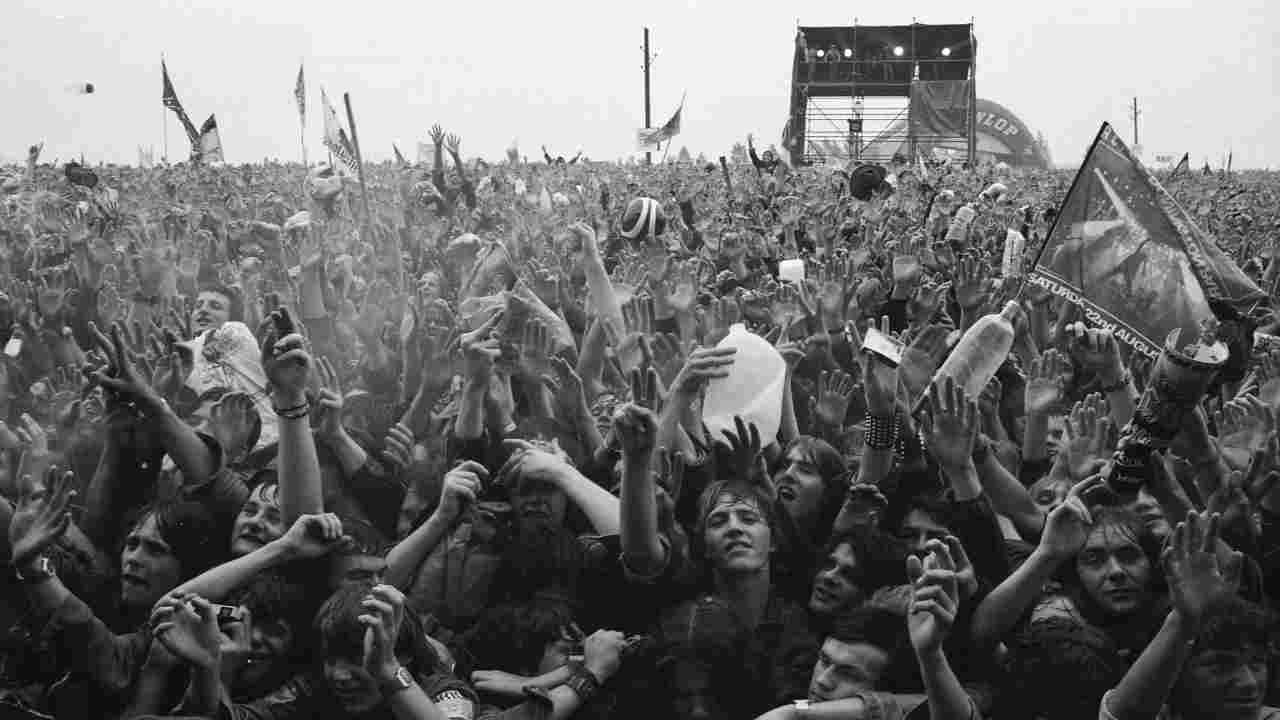
The world changed on August 16, 1980, or at least the corner of it where heavy rock lived did. That sodden late summer Saturday saw upwards of 40,000 denim-clad longhairs gather in a field in the East Midlands to witness the birth of an event that would play a huge part in shaping the decade to come: the inaugural Monsters Of Rock festival.
It was far from being the first outdoor mega-gig. Monterey, Woodstock, the Isle of Wight, Bath, Reading Rock And Blues Festival, Glastonbury Fayre, the California Jam… all of them had carved out their place in history, generating their own legends and folklore, heroes and villains.
It wasn’t even the first festival dedicated solely to hard rock or its snarling, leather-clad offspring, heavy metal. Since 1977, heavyweight promoter Bill Graham’s Day On The Green in San Francisco had become a showcase for the likes of Aerosmith, Ted Nugent, AC/DC and Van Halen.
But this new arrival, held in a vast bowl in the centre of a motor racing track near Castle Donington, Leicestershire as a showcase for Ritchie Blackmore’s Rainbow, was different. This was the first festival to proudly proclaim itself a rock festival. An unprecedented coming together of the tribes, transported by car, coach, train and motorbike from all four corners of the country and beyond.
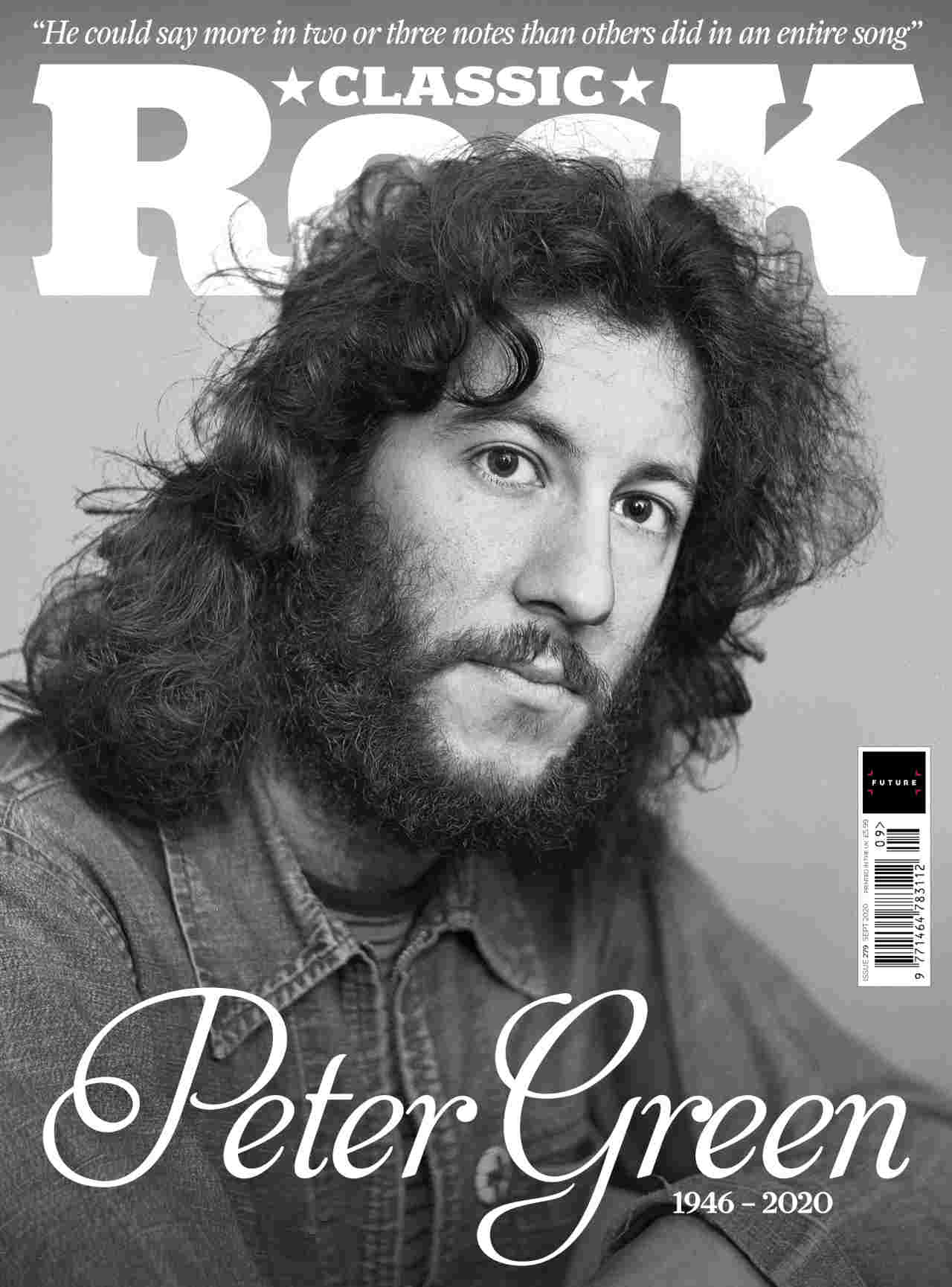
If Monsters Of Rock had ended there, on the cusp of a new decade, its place in heavy metal’s great mythology would be assured. But it didn’t. It returned the next year, and the year after that, and the year after that, each time growing in scale and importance. Over the next decade and a half, Monsters Of Rock – or simply ‘Donington’, as everyone who ever went knew it – became the single most important event in the hard rock and metal calendar, an alternative-universe version of Royal Ascot or Wimbledon or what Glastonbury has since become.
During its 16-year history, Monsters Of Rock hit triumphant peaks, not only mirroring heavy metal’s own journey but also defining it. There was glory along the way, and comedy. There was heartbreaking tragedy too.
The festival ended in 1996 but spirit lives on in Download, Wacken and countless other gigs that are indebted to it. But Donington was the wellspring from which everything else followed.
In 2020, Classic Rock told the story of the greatest rock festival of them all, by the people who were there.

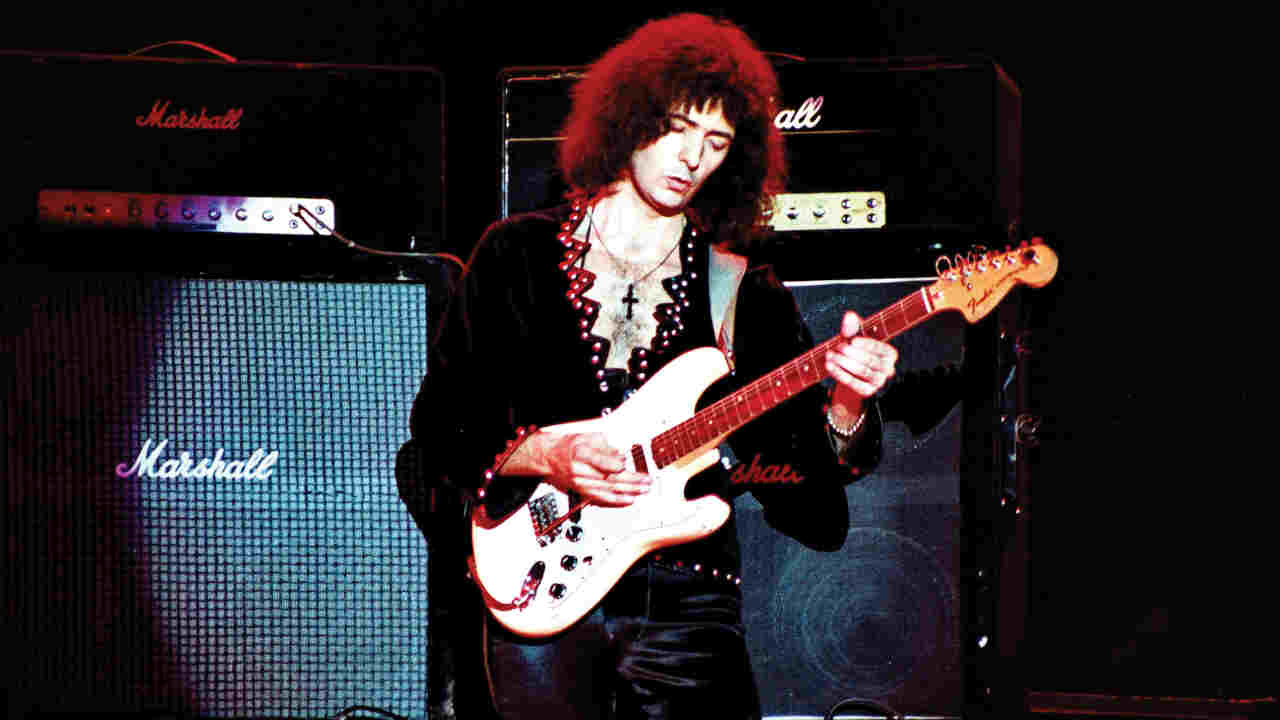
Rainbow entered the 1980s as unlikely pop stars. Guitarist and leader Ritchie Blackmore had replaced original singer Ronnie James Dio with Hawaiian-shirted livewire Graham Bonnet, reshaped the band’s classical sturm und drang into a sleeker, more chart-friendly sound, and been rewarded with a pair of Top 10 hits in Since You Been Gone and All Night Long. How better to celebrate than throw a huge party in a field in August?
Don Airey (Rainbow keyboard player): We did a show at Newcastle City Hall, and the next morning we’re all sitting round after breakfast waiting to get on the bus, complaining that there’s no big gigs any more. And Cozy [Powell, drummer] said: “Well, why don’t we hold our own festival”
Tim Parsons (concert promoter, MCP Promotions): Ritchie Blackmore wanted to finish their tour with an open-air show. Paul Loasby was Rainbow’s promoter, and he called Maurice Jones, who was my senior partner at MCP. Maurice liked the idea.
Bernie Marsden (Whitesnake guitarist): Maurice Jones was a very down-to-earth Midlander. He definitely wasn’t a Bill Graham figure.
Don Airey: Cozy knew the people who ran Donington Park race track. He phoned them up. Within a day we’d booked Donington
Rob Halford (Judas Priest frontman): We were very aware that it was the first festival of its type in the UK and was a major event in that respect. All the festivals that had happened in the UK before had had a cross-section of bands, so this was the first to go with specifically one type of music. Our reaction when we first heard about it was that we’d like to give it a crack.
Tim Parsons: The name was given to us by Peter Mensch, who had just taken over the management of AC/DC. He suggested it to Maurice: Monsters Of Rock. It sounded good.
Biff Byford (Saxon frontman): When they asked us to play this thing called Monsters Of Rock, we had no fucking idea what it was.

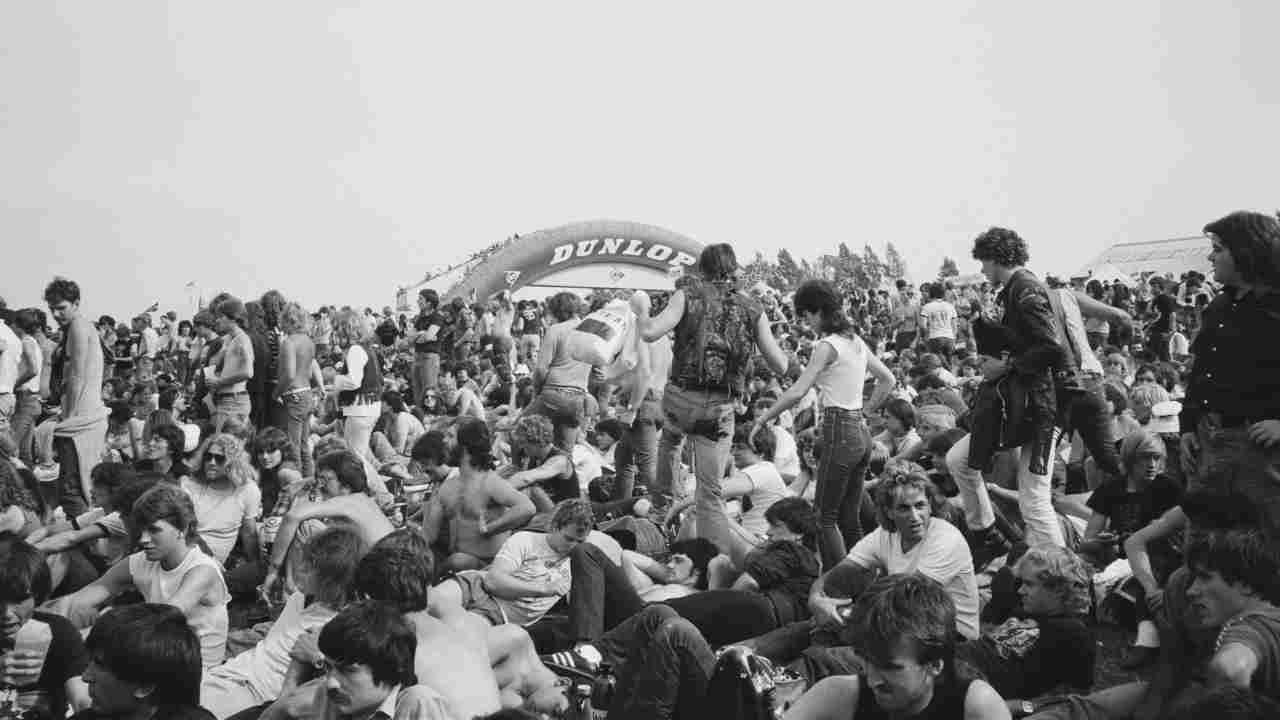
The date of the first Monsters Of Rock was set for August 16, 1980. The timing couldn’t have been better – the NWOBHM was in the ascendancy, and rock fans new and old were hungry for an event to call their own. But its success was by no means a shoo-in. The organisers needed to sell 30,000 tickets just to break even.
Tim Parsons: We were about a week away and we’d sold 20,000 or so tickets. We were looking at a disaster. Then in the last week or so sales literally doubled.
Andy Copping (rock fan and future Download festival boss): As a teenager who was into his rock music, this was something incredible. I’d been to see a load of gigs. Suddenly there was going to be this event which was specifically tailored for me.
Tim Parsons: We had rain in the days beforehand, which means we had a river running beneath the stage before it had even started.
Paul Loasby (Monsters Of Rock promoter): The amount of rain was unbelievable. The night before, at four in the morning when a monsoon is coming down in Castle Donington, I’m sitting there with a bottle of Scotch in my hand thinking: “This is the biggest disaster in the history of rock’n’roll and I’m going to lose everything.” Not that I had anything, but I was going to lose it anyway.
Tim Parsons: We got up on the morning of the show, not knowing what would happen.
Andy Copping: There were six of us that went in an open-topped land rover. As we were getting closer to the site, there was an AA sign which said ‘Pop Festival’. We were absolutely incensed. There was a policeman next to the sign and we were abusing him: “This is not a pop festival, this is a rock festival.”
Neal Kay (Heavy Metal Soundhouse DJ): I compered the first [MOR]. I was nervous, I’ve never faced a crowd that big before. But when I walked out on that huge stage, the first ten rows were all Soundhouse members.
Andy Copping: The stage was effectively just scaffolding with a couple of scrims over the side with the Rainbow album cover. It all took place in the middle of the race track. And of course you had that huge Dunlop tyre at the back.
David Ellefson (Megadeth bassist): I remember seeing photos of Donington when I was a kid, and there was always that Dunlop tyre. To me, that was like the crown jewel of the site.

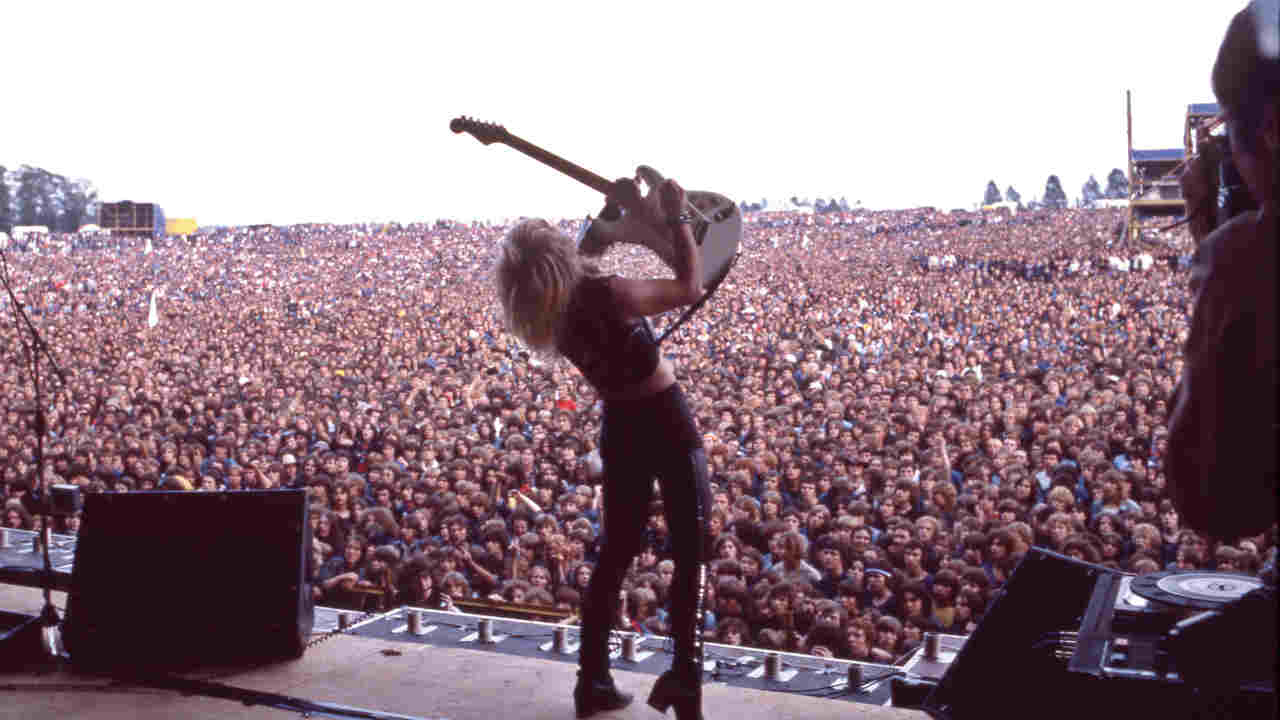
As well as Rainbow, the very first Monsters Of Rock bill also featured Judas Priest, Scorpions, Canadian rockers April Wine, Saxon, and New York bands Riot and Touch.
Mark Mangold (Touch songwriter/keyboard player): Naturally, we were in awe of what was going on, but no one could predict the history that event would have. It actually wasn’t pointed out to us for quite a few years that that’s what had transpired – that we were actually the first band on at the first Donington.
Andy Copping: There was quite a famous incident with the bass player from Touch and a bee.
Doug Howard (Touch bassist): I had an open bottle of beer on the side of the stage, and a bee somehow got in. I took a gulp of beer without realising the bee was there, and it was still alive and stung me. I had a bad allergic reaction.
Andy Copping: Best band that first year? It was a three-horse race between Saxon, Scorpions and Judas Priest.
Biff Byford: When we walked on that stage we’d done a hundred thousand records. I would imagine that ninety-nine per cent of the people in that audience had got Wheels Of Steel. The roar when we went out on stage was incredible. When I walked off I thought: “Follow that.” That was a fucking great gig.
Tim Parsons: I always remember Klaus Meine from the Scorpions being piggy-backed to the stage with his ballet shoes on because of the mud. Quite an incongruous scene.
Klaus Meine (Scorpions frontman): Ah, 1980. It was very wet, wasn’t it?
Don Airey: I remember Judas Priest turned up for their sound-check looking so rock’n’roll – leather jackets, unshaven, hadn’t slept. They did their sound-check and Ritchie said to me: “Wow, it doesn’t do to get too complacent.” They were just amazing.
Tim Parsons: Rob Halford wanted to use his motorbike, but there was some issue about making sure there was no petrol in the tank and all that kind of bollocks.
Rainbow – All Night Long (Live At Monsters Of Rock Donnington 1980) – YouTube 
Andy Copping: I was obsessed with Ritchie Blackmore, I was obsessed with Rainbow. But the show was average.
Don Airey: It was an amazing show.
Graham Bonnet (Rainbow frontman): We had no clue that there would be so many people in the crowd. We expected maybe ten thousand at most. I go on stage, look out and see… Christ! There must have been sixty thousand or something. No pressure.
Don Airey: At sound-check the day before, Cozy had said he was going to use the biggest explosion ever heard on a British stage. He blew all the cones on his PA. That was just rehearsal. He couldn’t use it the next day, cos they’d had to repair the PA. So it was only a small explosion on the night compared to what it should have been.
Graham Bonnet: People still go on about my Percy Edwards impression [Bonnet did an impression of the noted birdsong whistler during Rainbow’s set]. They ask me why I did it. I have no fucking idea! It just came into my head, and without thinking I just blurted it out. Was it silly? Yes, very silly. But then that was the charm of the occasion. Here was this vocalist fronting a heavy rock band, wearing a Hawaiian shirt. After that anything else was never gonna seem daft.
Andy Copping: We’d gone down the front to watch Rainbow, and one of my mates said: “Look behind you.” We looked back up the hill and there were hundreds of bonfires. It was like something out of Game Of Thrones.
Biff Byford: This was the new generation of heavy metal. This was our music – fucking have it!

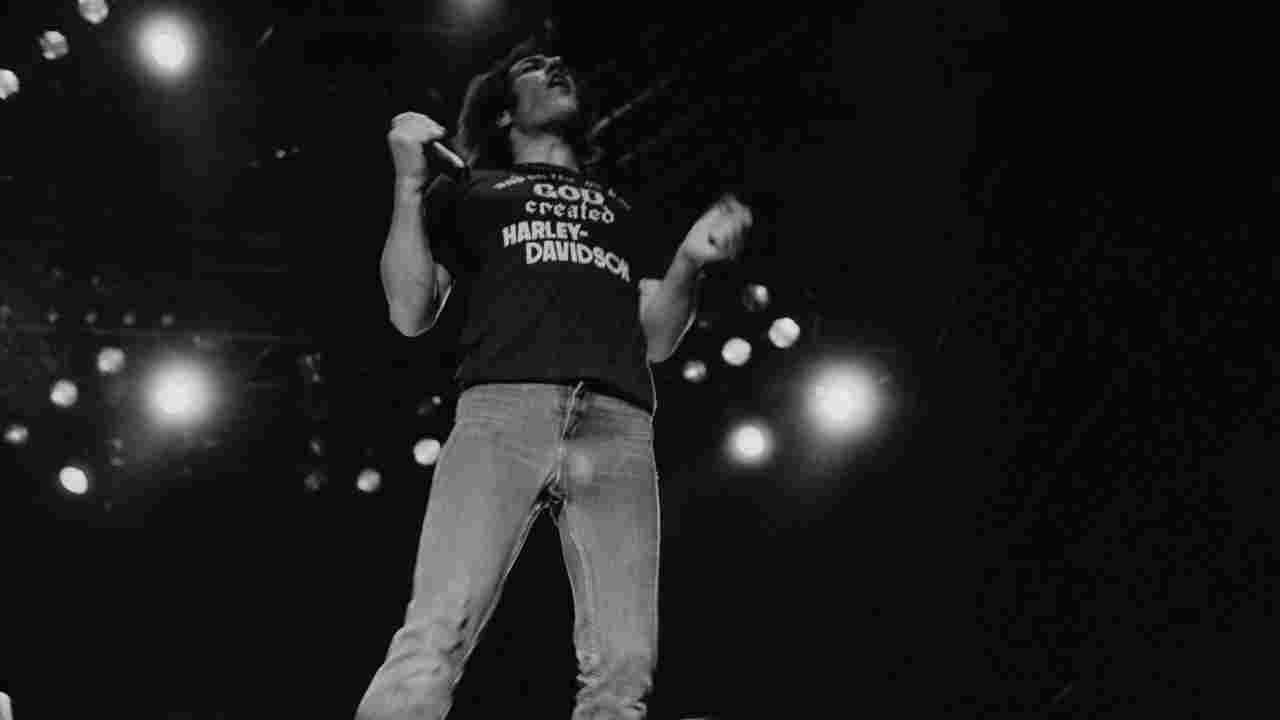
The organisers’ fears that this brand-new festival would be a disaster were unfounded. The first Monsters Of Rock was a huge success. So much so that another was planned for the following year. AC/DC, riding high on the success of Back In Black, were booked as 1981’s headliners, with support from Whitesnake, Blue Öyster Cult, Slade, Blackfoot and more.
Dave Hill (Slade guitarist): Maurice Jones got on the phone and said: “I think you should be on it. We’ve got AC/DC, we’re expecting a huge crowd.” He wasn’t kidding, either. It was bloody mega. You couldn’t see the end of it.
Bernie Marsden: I don’t think anybody can be prepared for how big the crowd was. You walk out and suddenly there’s this sea of denim and leather as far as you can see. I remember going out between the monitors at the front and looking left and right and seeing this enormous crowd.
Andy Copping: Slade had done Reading the year before, and they were absolutely brilliant. They weren’t quite as good at Donington, but they were still good.
Dave Hill: We used to throw out toilet rolls like big streamers, and the audiences would throw them back. We thought: “We’re gonna need a heck of a lot of toilet rolls for a crowd that size.” So we sent the roadies out to Sainsbury’s to get as many as they could.
Andy Copping: They played the Christmas song, of course. Hearing it being sung in the middle of August by eighty thousand-odd heavy metal fans was something else.
Dave Hill: Blue Öyster Cult were on after us. That probably wasn’t good for them.
Bernie Marsden: Blue Öyster Cult didn’t seem to understand the running order, and I think they considered themselves to be in a much higher position on the bill than they were.
Eric Bloom (Blue Öyster Cult singer/guitarist): AC/DC had opened for us somewhere in the US, and they were pissed off that they didn’t get all the lights and the sound and whatever. So they took it out on us at that festival. They wouldn’t allow me to ride a motorbike on stage, and our soundman said the sound system had been sabotaged. We might as well have just played Reaper and got off, cos nobody could hear what we were doing.
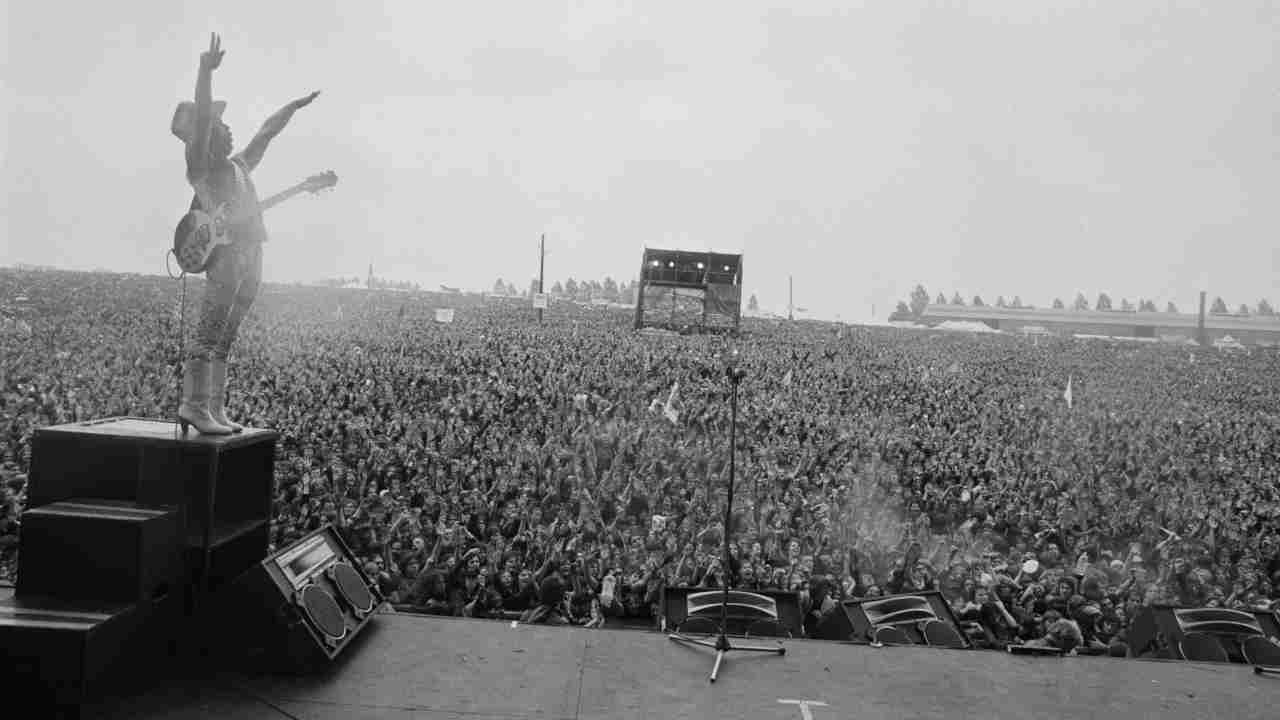
Bernie Marsden: Maurice had a plaque made of the poster and given it to each of the band members, with everyone’s name on: ‘From Maurice, with love.’ Blue Öyster Cult made a big scene outside their trailer, where two or three of them jumped up and down on their plaque: “We don’t want this.”
Eric Bloom: I was pissed off. I was young and full of myself. I took the plaque, laid it on a rock and called over every photographer in the place and said: “Here’s a good photograph for you,” and I proceeded to stomp.
Bernie Marsden: There was never any ‘Follow that’ with us and AC/DC. I remember when we came off, I was walking across the backstage area and Malcolm Young was walking across. He just put his thumb up to me and grinned, as if to say: “You’re gonna make us play again, aren’t you?”
Brian Johnson (AC/DC frontman): We were shitting ourselves. “Fuck, we haven’t played this! We haven’t rehearsed anything!”
Bernie Marsden: Nobody blew AC/DC off. Nobody even got close. Once that bell started to toll and they went on, it was electric.
Andy Copping: If there’s one band who embodies Monsters Of Rock, it’s AC/DC. Them or Metallica. But whenever AC/DC have come back to Donington it’s been as headliner.

After two successful years, Donington had established itself as the home of hard rock and heavy metal. Which made the decision to book boogie warhorses Status Quo to headline the 1982 Monsters a controversial one – and sluggish ticket sales reflected it.
Alan Lancaster (Status Quo bassist): It was a bit confusing – it was called Monsters Of Rock, but we weren’t really a heavy metal band. It was a pretty miserable day. Windy, slightly rainy.
Steve ‘Lips’ Kudlow (Anvil frontman): When we were told we were opening Monsters Of Rock in 1982, I thought it was gonna be the moment my life changed. I don’t think we were out there for longer than three seconds before hunks of mud and piss bottles filled the air. We were looking at each other, like: “What the fuck is going on?”
Andy Copping: Bottle fights at Donington were a rite of passage.
Tim Parsons: April Wine, the first year, was the first bottle-throwing incident, in terms of people throwing piss all over the place.
Andy Copping: You never knew what was in the bottles. Firstly, you wouldn’t want to get hit with one, cos it hurt. Secondly, you wouldn’t want to get hit with one with its lid off, because it would splatter everywhere.
David Ellefson: When you’re up on stage, you see these bottles spinning as they come towards you, with these big, twelve-feet wheels of piss coming out of them.
Lars Ulrich (Metallica drummer): The first time we played at Monsters of Rock at Donington, in 1985, a pig’s head was thrown up on stage while we were playing. First you gotta acquire a pig’s head… then you’ve gotta get it in the venue… then you’ve got to get up to the front. And at some point you’ve gotta launch the pig’s head up on stage for it to land in close proximity to the singer.
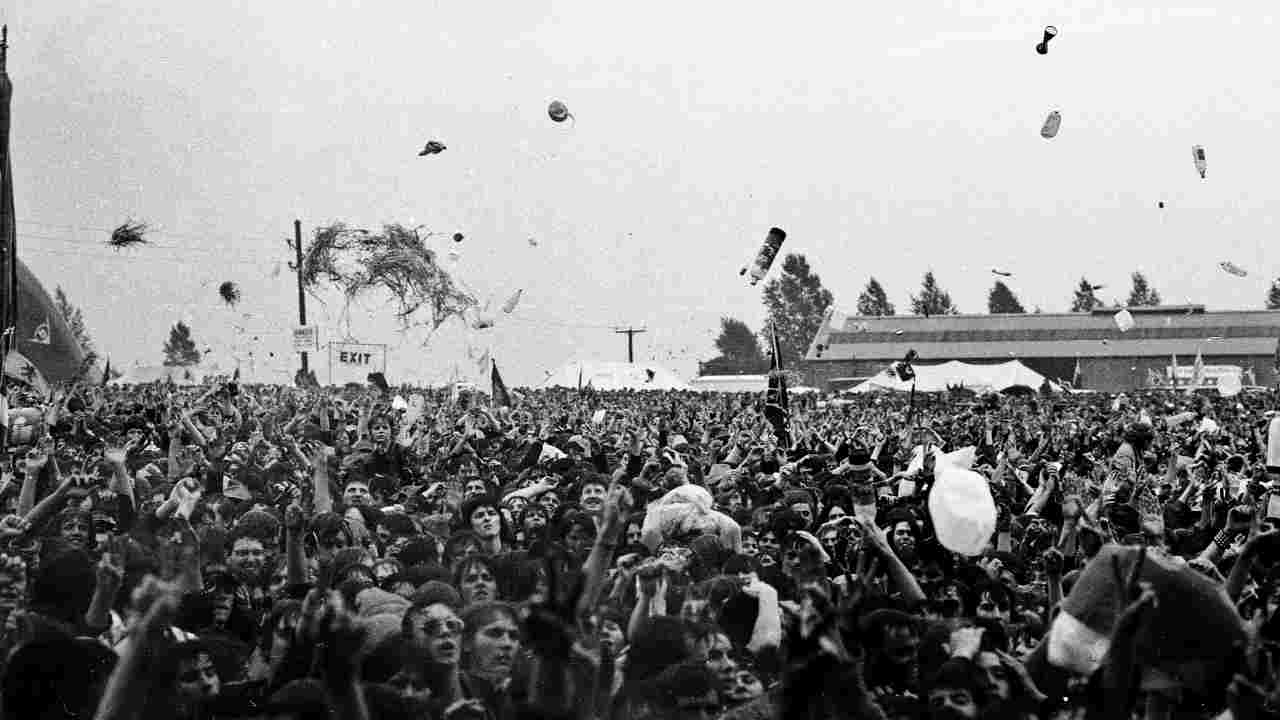
Scott Ian (Anthrax guitarist): When we played in 1987, we had already heard from Metallica about people throwing shit on stage. They were, like: “Just don’t pay it any mind. If you let it bother you, they’re gonna see you’re weak and they’re gonna double down on it.”
David Ellefson: I remember when we played, having to use my bass as a sort of staff and sword to defend myself against mud and bottles of piss.
Scott Ian: I can dodge a piss bottle coming from hundreds of yards away pretty easily.
Andy Copping: The worst bottling? Bad News in 1986. They actively encouraged it. The stage looked like hell while they were playing. I loved The Young Ones and Bad News, but they shouldn’t have been on that stage anyway.
Lips: It was pretty bad for us when we played. I just felt relieved that I got through it. We got off the stage and we just died.
Alan Lancaster: No one bottled us. We said: “We’re gonna get everybody in the mood for this”, and we worked our arses off. We felt they deserved something for standing there in the rain through fucking Hawkwind.

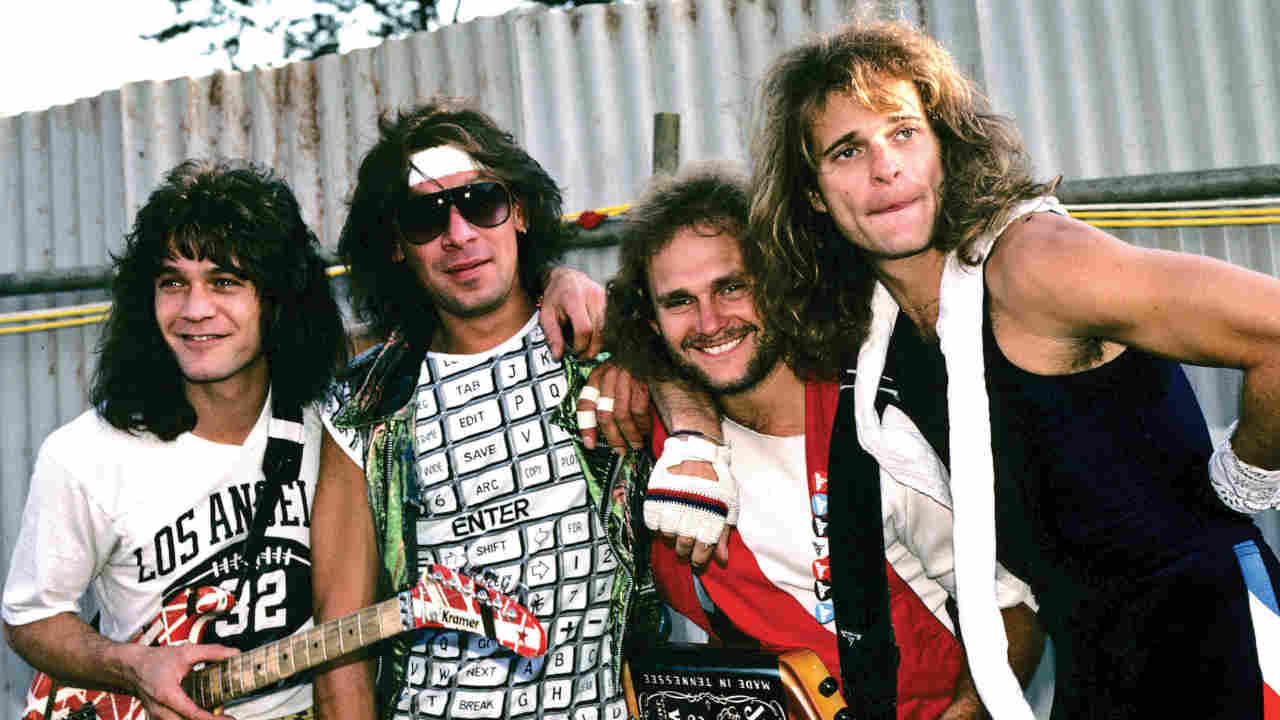
The 1983 bill, headlined by a returning Whitesnake, righted the ship, but it would be 1984’s festival that remained the gold standard for Monsters Of Rock. AC/DC were the marquee name once more, but all eyes were on two bands from California: second-on-the-bill Van Halen and openers Mötley Crüe.
Tim Parsons: It had become incredibly well-established around the world, which is why Mötley Crüe flew over on Concorde to do the show and then flew back.
Andy Copping: 1984 was a very glamorous year, and that was down to Van Halen and Mötley Crüe.
John Tucker: Half the people there were really looking forward to Mötley Crüe, the other half thought they were just made-up poseurs and were ready to throw things at them.
Vince Neil (Mötley Crüe frontman): We were outta control kids back then. That was the time when we were into biting everyone. We’d run around backstage, grab people and bite them. It didn’t matter who they were, or where we bit them! I bit Eddie Van Halen’s hand. He wasn’t happy at all.
Nikki Sixx (Mötley Crüe bassist): We loved AC/DC. Everybody loved AC/DC.
Vince Neil: I remember Nikki standing close to Malcolm Young. Malcolm must have said something nasty to Nikki, because the next thing I knew, Nikki had Malcolm by the throat and was lifting him off his feet against the wall! Great, we’re the openers and they’re the headliners.
John Tucker: Mötley Crüe came on half an hour before they were scheduled to and they took no prisoners.
Vince Neil: I just remember people telling us, since we were one of the openers, you’re gonna get pelted with piss bottles. I actually went on stage wearing a hard hat, as a joke.
Mick Mars (Mötley Crüe guitarist): Nikki got hit in the mouth with a cup of piss. And Tommy had this eyeball on his kick drum.
Tommy Lee: I think it was a cow’s eye or a horse’s eye, I don’t know. They all look the same. I’ve seen some weird stuff come up on stage, from darts to knives. But a cow’s eyeball? Okay, you guys win. You guys are officially weirdos.

John Tucker (fan, and author of Monsters Of Rock: The History Of Donington): Mötley Crüe were superb. Thirty, forty minutes, no messing around. Van Halen were the exact opposite. The bass gets lobbed into the crowd at the end and they walked off heroes.
Vince Neil: I have no idea if Nikki ever got his bass back.
John Tucker: Van Halen were the exact opposite. They were awful.
Andy Copping: Van Halen were falling apart. Backstage, Dave Lee Roth got his own room because the rest of the band didn’t want to be around him.
John Tucker: They were going through the motions. A drum solo in the second song, Dave Lee Roth just fannying around and coming out with the usual stage raps.
Andy Copping: His onstage banter was amazing: “Only stick your tongue out at me if you’re going to use it”, “If you start abusing me I’m gonna come down there and fuck your girlfriend…” All the things he’d been using for years. Probably still is.
Bernie Marsden: I went that year, and I stood on the side of the stage with Gary Moore [also on the 1984 bill] when Eddie was playing. Gary knew about him but had never seen him. Eddie was going for it, and I looked round during the second or third song in and Gary’s jaw had just dropped. He said to me: “I didn’t know he was that good.” And that was from Gary Moore.
Andy Copping: Nobody talks about how amazing Ozzy was that year. He was third on the bill, but he was incredible.
John Tucker: Ozzy was superb. A year before, he’d been playing to half-full venues. All of a sudden he came out and delivered this great performance. When he came back a couple of years later [in 1986] he was headlining. He was lowered down from the rafters, on a throne. That was him going: “I’m the headliner, I can do what I want.”

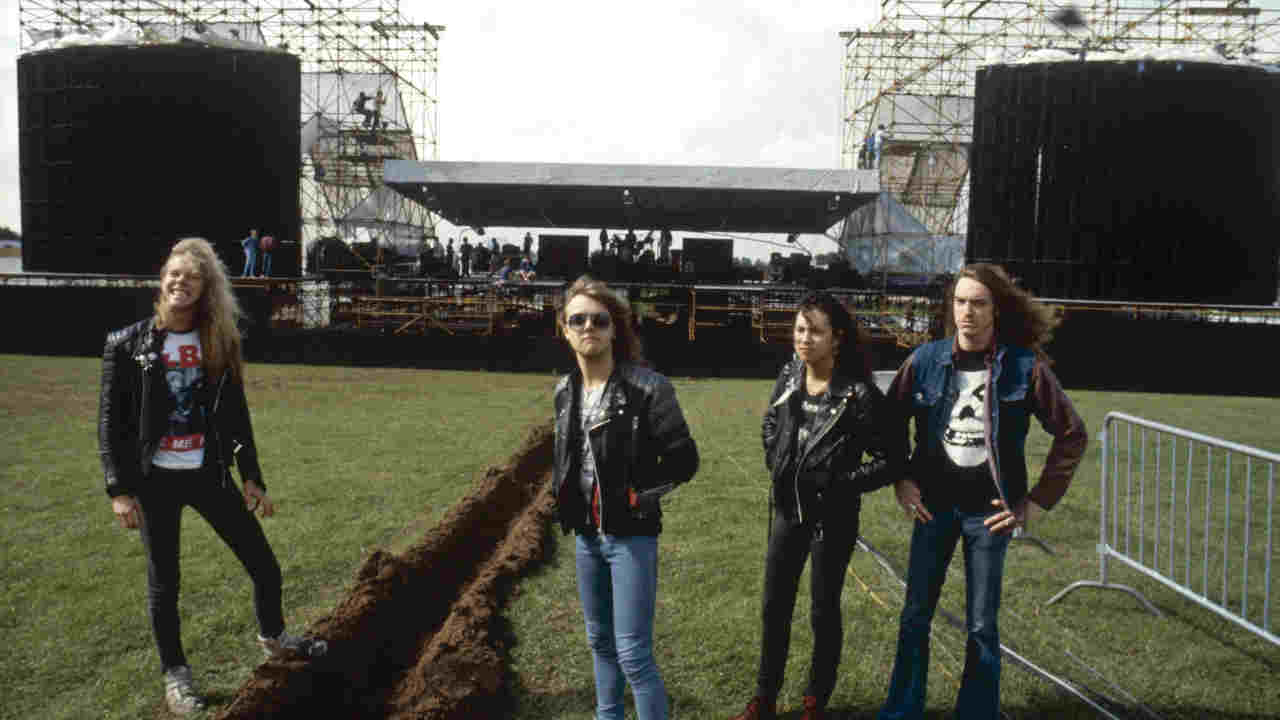
By the mid-80s, Monsters Of Rock had gathered an unstoppable momentum. Big names, up-and-comers and wild-cards queued up to appear on the Donington stage. The 1985 bill was headlined by ZZ Top, who two years earlier had roared into the fast lane with Eliminator, with an at-the-top-of-their-game Marillion just below them on the bill. But it was the under-card, featuring an in-the-ascendancy Bon Jovi and a comparatively unknown Metallica, that pointed the way to what the second half of the 80s would look like.
Andy Copping: Back in 1985, people were: “Why is this horrible thrash band playing at Monsters Of Rock?” The band really hadn’t caught on by that point.
John Tucker: Metallica copped a fair few bottles.
James Hetfield (Metallica frontman, speaking from the stage): “If you came here to see spandex and fuckin’ eye make-up and all that shit, and the words ‘Rock’n’roll, baby’ in every fuckin’ song, this ain’t the fuckin’ band. We came here to bash some fucking heads.”
Fish (Marillion frontman): There was a load of people who were more interested in getting into the Bon Jovi backstage area than anybody else’s. They were being heralded as being the greatest band that will ever be. I watched the set for a bit, thinking: “I don’t really see anything.”
John Tucker: I think there were some strains behind the scenes that year.
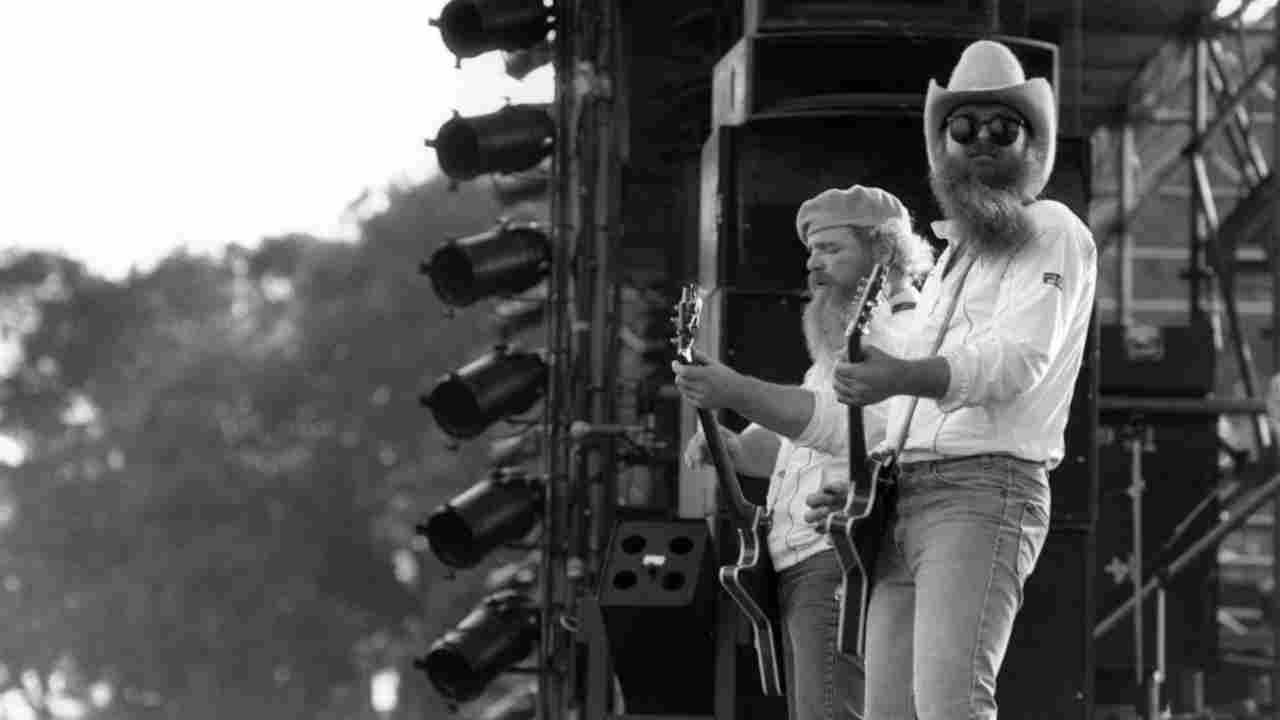
Fish: ZZ Top’s management had basically declared that the festival was theirs. It was more like a ZZ Top gig with everybody else as support acts, rather than the Monsters Of Rock festival. There was a bad vibe backstage, because they had their own area that was marshalled by all these goons.
John Tucker: ZZ Top actually flew their car [the ‘Eliminator’] over the site while Marillion were on.
Fish: I was up on stage, thinking: “What the fuck is that?”
John Tucker: That was bizarre. You very often saw helicopters going over, and you wondered who was coming in or leaving. But you don’t see them with a car dangling underneath them.
Fish: Was it coincidence? No, because it was supposed to be flown over before they started their set. It was supposed to be their big intro. I just thought it was a little bit childish.
John Tucker: ZZ Top were actually good. They’d really have to have shot themselves in the foot to make a mess of things.
Fish: ZZ Top… it wasn’t as live as you thought it was. There was a lot of back-up stuff up there. We were just going out and playing live-live. We took the day. We definitely gave ZZ Top a bloody nose.

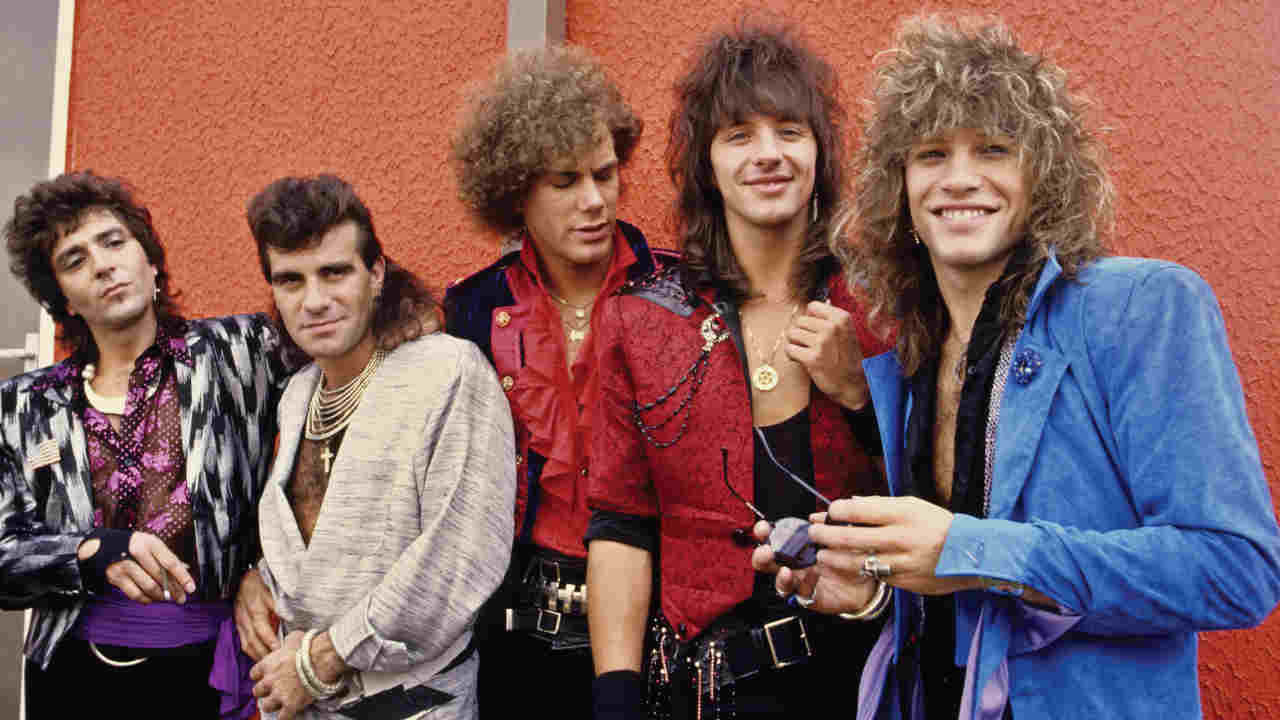
By the mid-80s, rock and metal was bigger than ever, and the Monsters Of Rock benefitted from the knock-on effect. In 1986, a newly rejuvenated Ozzy Osbourne topped the bill over the Scorpions and Def Leppard – the latter making their first big appearance since drummer Rick Allen’s near-fatal car crash 18 months earlier.
The following year saw newly minted superstars Bon Jovi headlining (with support from Dio, Metallica, Anthrax, WASP and Cinderella), although the bill reflected the major sea changes that were taking place within the rock scene.
Scott Ian: I’d heard of this thing called Monsters Of Rock from the very earliest days of reading Kerrang! and Sounds. But there was nothing like it in our small little world in New York City. It just seemed like a dream, a fantasy. It might as well have been the fucking Wizard Of Oz.
John Tucker: In 1987 there was supposed to be this big battle between thrash bands and glam bands – Anthrax and Metallica on one side, Cinderella, Bon Jovi and even WASP on the other.
Scott Ian: People were talking to us about that, trying to play up that angle. But I never looked at it like that.
John Tucker: There was a bit of a divide in the audience. You had one set of people coming to the front for Anthrax and Metallica, and then hanging back for Cinderella, and the other way round.
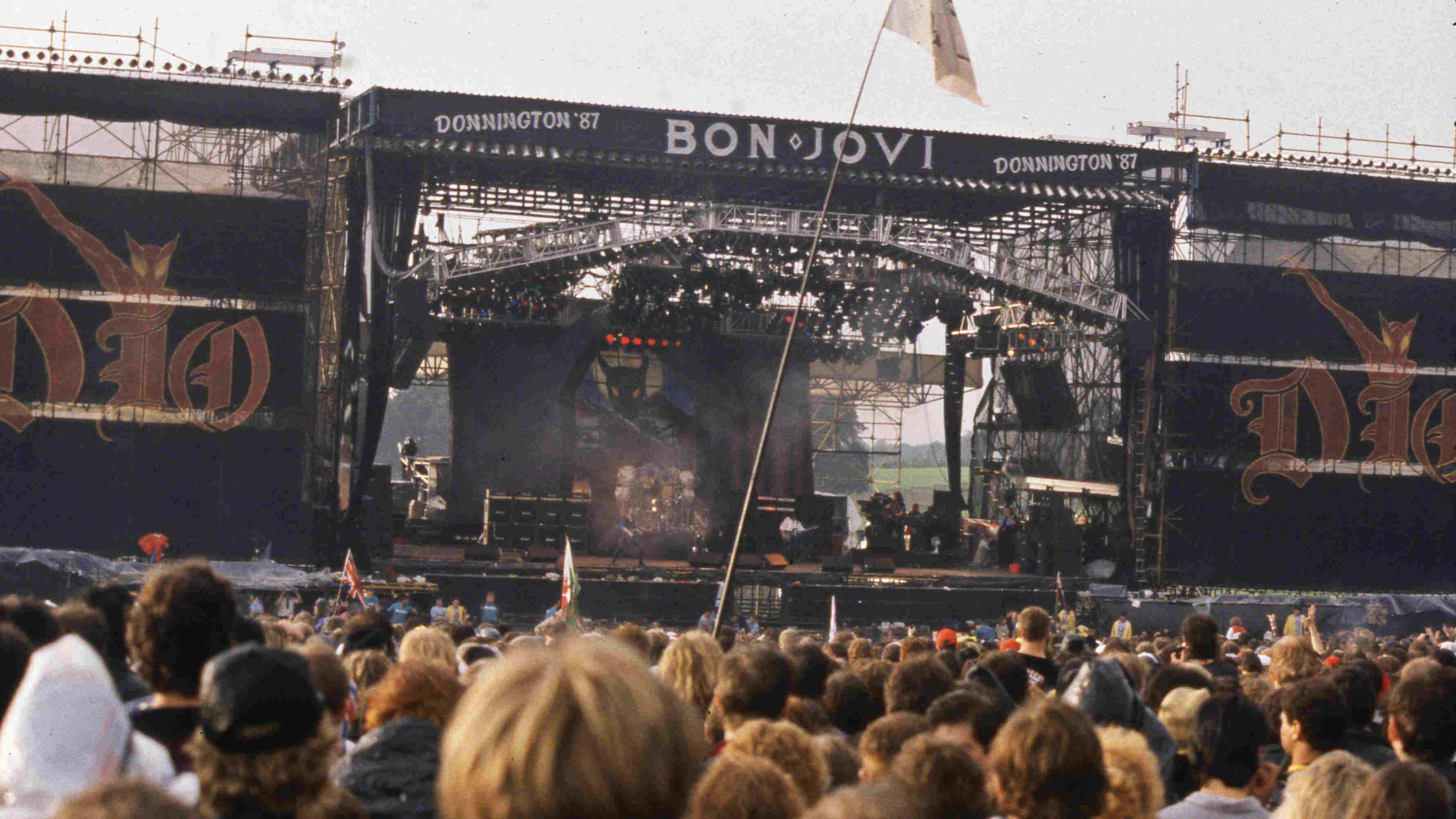
Brian Tatler (Diamond Head guitarist): Metallica invited me to come and see them at Donington. We’re watching them play [their cover of Diamond Head’s] Am I Evil?, and my mate Shaun taps this guy on the shoulder, points at me and goes: “He wrote this.” The bloke looks at me for a second and goes: “Did he fuck”, and carried on headbanging.
John Tucker: From the promoters’ point of view, Bon Jovi were huge.
Scott Ian: Bon Jovi had their own compound backstage. Our bass player, Frankie [Bello], got thrown out of the bathroom cos Jon had come to take a piss. Frankie was in there and this security guy goes: “You gotta get out.” And Jon Bon Jovi was standing outside, waiting to go in. He couldn’t piss while somebody else was in there.
John Tucker: The audience was definitely different that year. It was more of a female crowd. As it got close to Bon Jovi’s show time there was this undercurrent of screaming, high-pitched voices, which you didn’t usually hear at Donington.
Andy Copping: Bon Jovi spelled ‘Donington’ wrong on the banner. They’d put two ‘N’s: ‘Donnington’.
John Tucker: It wasn’t like something on a burger van, it was right across the stage in bloody great letters. Somebody should have been shot for that.
Scott Ian: It had been pissing down with rain on [opening bands] Cinderella and WASP. As soon as WASP walked off stage, the clouds started to clear and there was beautiful weather for Anthrax, Metallica and Dio. And as soon as Dio finished it started raining on Bon Jovi. Mother Nature must love thrash metal.

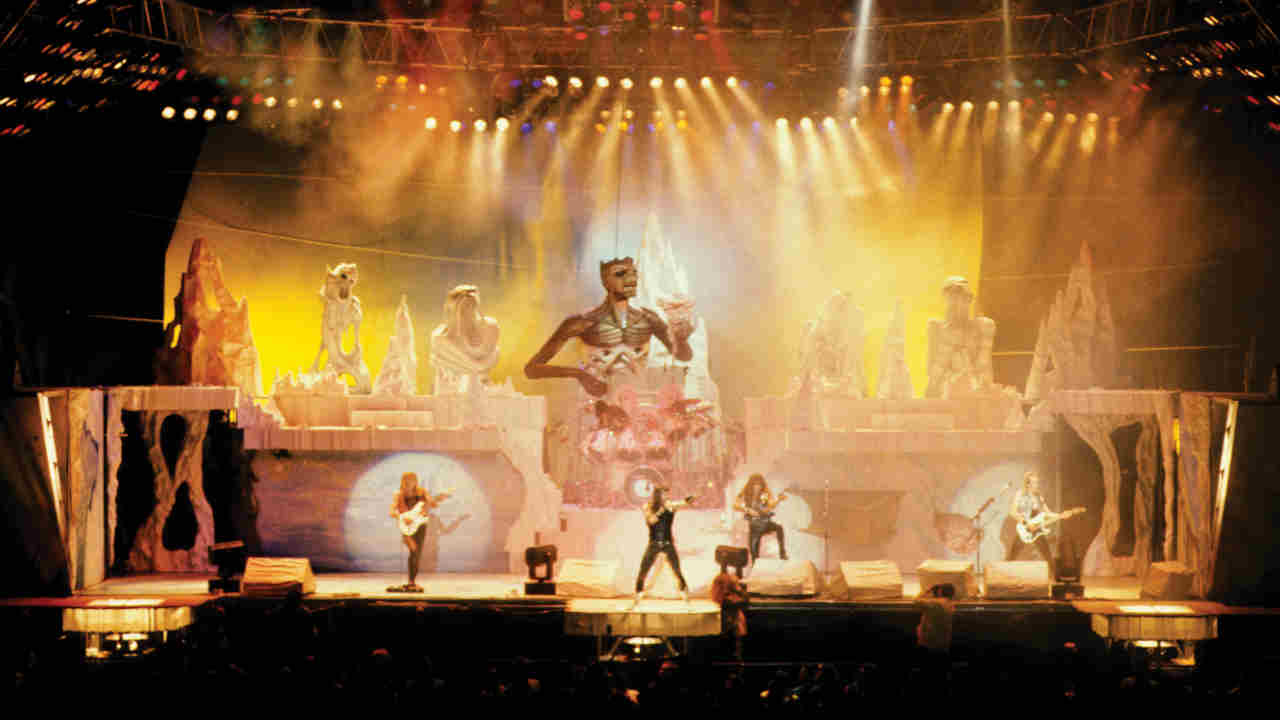
After the escalating triumphs of the festival’s first eight years, 1988’s Monsters Of Rock was shaping up to be its crowning glory. The organisers had finally bagged Iron Maiden as headliners after several times of asking, Kiss and Dave Lee Roth provided A-list support, and openers Helloween and thrash livewires Megadeth represented metal’s new generation. But all eyes were on LA hotshots Guns N’ Roses, who had released their debut album Appetite For Destruction the previous summer and whose career trajectory had just hit a dizzying upswing. It was during Guns’ set that what should have been a triumph turned into an unimaginable tragedy.
David Ellefson: Getting invited to do this, that was the big league. We ran into the Guns N’ Roses guys at a truck stop on the way up from Heathrow. They’d come across on Concorde for one day, just to do that show. They were as excited as we were.
John Tucker: The crowd was significantly bigger. People were there to see Guns N’ Roses.
Andy Copping: Apparently twenty thousand people turned up on the day and bought a ticket. The most we’ve ever had at Download is three thousand. I arrived late. All the people I knew used to meet up behind the mixing desk, because it was the one place where there was space. When I got there that year, I couldn’t get anywhere near the mixing desk.
John Tucker: Helloween came on and did their thing. Then Guns N’ Roses came on. They went down well. Too well.
David Ellefson: Guns N’ Roses were on fire. I remember Slash walking over to his amp, taking a swig of Jack Daniel’s, going back out and completely kicking ass.
John Tucker: Their set was disjointed. There did seem to be a lot of slow material. That makes sense – they later said they tried to slow the pace down.
David Ellefson: I remember there was a scuttle in the crowd when Guns were on stage. They had to pause the show.
John Tucker: They told the crowd to move back several times.
Tim Parsons (MCP): The security are telling you that something is going on, and you become aware that something is happening. And then you become aware that what’s happening is really serious.
Andy Copping: It was tragic. People were getting drowned in mud.
David Ellefson: The rumour started to circulate backstage about a couple of kids maybe getting crushed in the audience during Guns N’ Roses’ set. And then we started to hear that they had died.
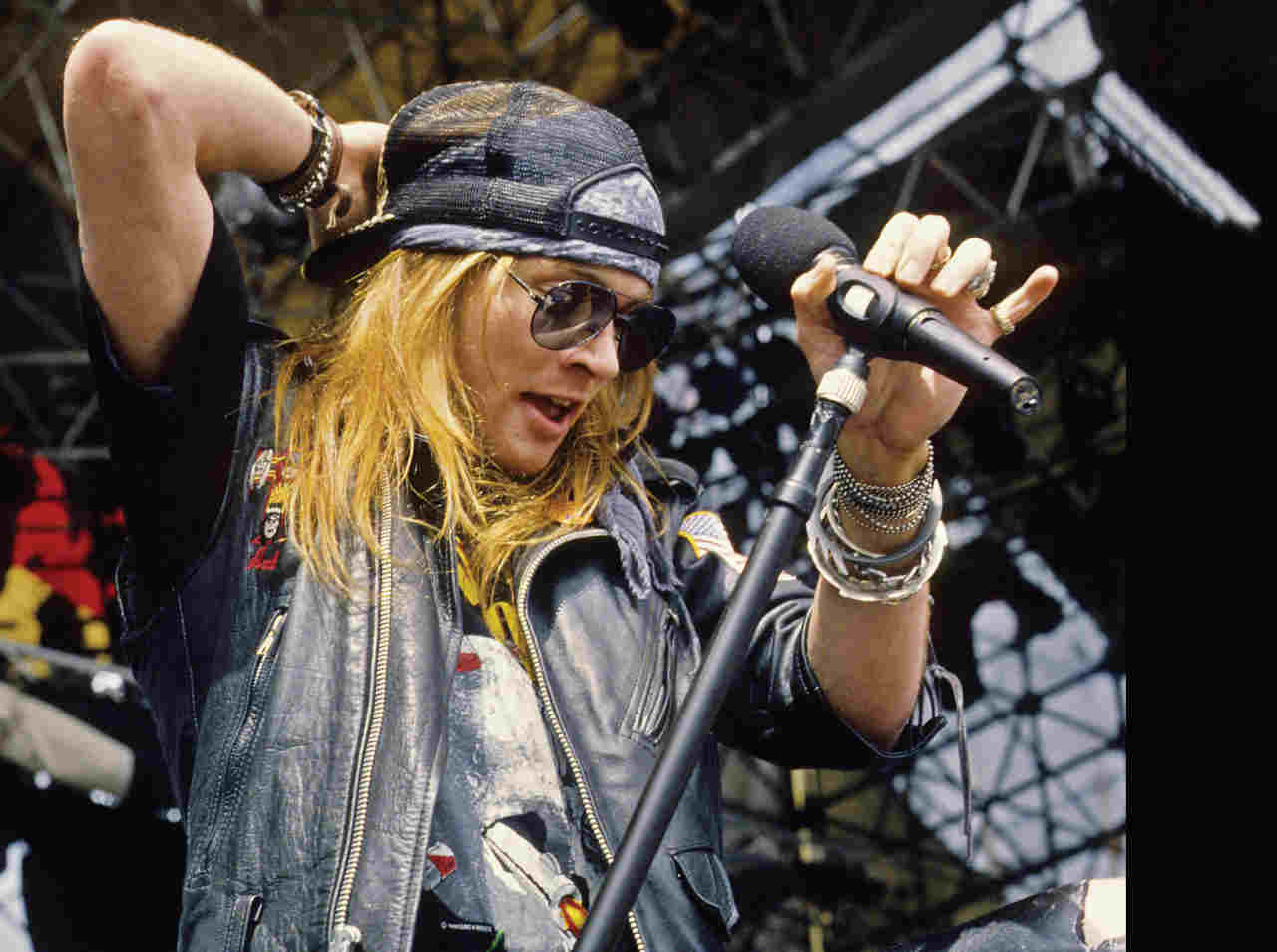
Two fans had indeed died during Guns N’ Roses’ set: 18-year-old Alan Dick and 20-year-old Landon Siggers.
David Ellefson: Dave [Mustaine, Megadeth frontman] and Chuck [Biehler, drummer] had to go and do a radio interview and were asked to not bring it up at all on the air: “Do not say anything about it.”
Tim Parsons: There was a particularly obnoxious policeman who was talking about shutting the show down. I pointed out that what had happened would happen again, except with the whole audience rather than just a section.
David Ellefson: Being the band that came up next was hard. There’s this tragedy that has happened, and you’re not able to address it. We felt: “How do we get control of this audience?” It’s a festival, it’s not really our show, and it’s the first time we’d been in that large a crowd. Luckily Dave is really good about that. He has no bones about stopping a show if he thinks that somebody in the audience is getting injured or if he thinks that security needs to take measures to protect somebody.
Andy Copping: Let’s not forget the security people there on the day who had to go into the crowd to pull people out. These weren’t crowd surfers they were pulling out, the security people were having to go in there and save people’s lives.
Tim Parsons: It was a heroic effort by lots and lots of people to cope with an unthinkable occurrence.
John Tucker: Maiden turned it on like they did whenever they played, but obviously that day had been overshadowed by what happened earlier.
Andy Copping: You’ve gone to a festival, something you’d been looking forward to for months and months on end. Never would you have thought that somebody would have come away injured, let alone dead. It’s incomprehensible.
Tim Parsons: We learned so much from that year, and it’s benefitted every concert that’s happened subsequently. Not just ours, but everyone’s.


The tragic events of 1988’s Monsters Of Rock left a scar on Donington that would never fade. The organisers considered ending the festival completely, but instead elected not to hold it in 1989, partly to honour the memory of Alan Dick and Landon Siggers, and partly to ensure that new safety regulations could be put in place in order to prevent such a tragedy ever happening again. The first band to grace the Donington stage when MOR did return on August 18, 1990 were fast-rising hard rockers Thunder, in a year headlining by the returning Whitesnake.
Luke Morley; Obviously we were aware of what had happened, and it was in our minds. But it was our job to open the show. So that’s what we did.
Tim Parsons: Thunder’s performance was the making of the band.
Luke Morley: Did we feel the pressure? Oh god yes. But as soon as we walked on stage and Danny [Bowes, singer] opened his mouth, I knew it was going to be okay. It was the quickest forty minutes of my life. We all came off stage and went: “Fuck me, that was good, wasn’t it?”
Tim Parsons: That was the first year it was broadcast live on Radio 1. That was a proud moment, because Radio 1 was so anti-rock music. [Radio 1 controller] Johnny Beerling said: “If David Coverdale says ‘Fuck’ one more time, I’m taking you off air.”
Andy Copping: The early 90s Monsters Of Rock definitely some great bands and great moments. Skid Row were amazing in 1992. Sebastian Bach came onstage, slipped straight on his arse, stood straight back up and laughed it off. But in hindsight, it was starting to go off a cliff.
John Tucker: The pool of headliners was shrinking.
Andy Copping: The reality is that Monsters Of Rock, unfortunately, didn’t move with the times. Faith No More, Red Hot Chili Peppers, Rage Against The Machine, Pearl Jam, Nirvana – not one of those bands played the festival. But then was a lot of resistance from those bands – they didn’t want to be associated with something that was called Monsters Of Rock.
John Tucker: Towards the end they started having two stages – one for up-and-coming bands. It changed the vibe. I liked the days of seeing six or seven bands on one stage then going home.
Tim Parson: Was it hard to pull the plug? Of course. It meant a lot to an awful lot of people.
John Tucker: It was sad to see the end of it. All of a sudden, you weren’t going there any more.

The final Monsters Of Rock took place at Donington in 1996, co-headlined by Kiss and Ozzy Osbourne. Aside from a one-off show by Stereophonics – who had attended MOR as teenagers – Donington Park remained a gig-free zone until the first Download in 2003.
Tim Parsons: Was it hard to pull the plug? Of course. It meant a lot to an awful lot of people.
John Tucker: It was a pilgrimage. You’d be freezing cold, absolutely wet, going: ‘I’m not doing this again.” And then you’d trundle off to the coach park and say: “Who’ll be playing next year?”
Brian Tatler: Other festivals owe it a huge debt. They copied that blueprint.
Fish: It wasn’t as tight and controlled as festivals are now. It was beautiful chaos.
Andy Copping: I’ve always said that Download [started in 2003] is the bastard child of Monsters Of Rock. No doubt about it.
Lips: I was in one of the bands that played the Monsters Of Rock, and I always will be. Not everyone gets to say that. It’s part of metal history, and I was part of it.
David Ellefson: It was the biggest of the big, the best of the best. The name says it all. It’s scary, it’s demonic, it’s got the word ‘Rock’ in it.
Dave Hill: At the end of the day, we’re all monsters of rock.
Originally published in Classic Rock issue 279, August 2020
